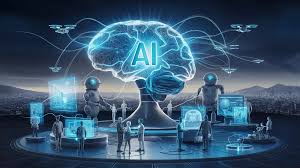The Future of Resilient Organizations: AI Agents, Synthetic Data & Executive Literacy

Businesses today face a gauntlet of volatility—geopolitical maneuvering, new data sovereignty laws, and complex AI regulations like the EU’s Cyber Resilience Act. The solution? A forward-looking framework built on three foundational pillars:
AI Agents: Autonomous Decision-Makers
Imagine intelligent systems not acting as passive tools but as active collaborators. These AI agents process real-time data, make decisions, and trigger immediate responses—ideal for logistics coordination, cybersecurity incident response, or dynamic resource management.
Synthetic Data: Simulation Without Compromise
As privacy norms tighten, real-world datasets become harder to leverage. Enter synthetic data—safe, flexible, regulation-friendly, and tailored to fuel AI models without exposing sensitive information. It’s the scalable lifeblood for robust, compliant training environments.
Executive AI Literacy: Strategy Plus Safeguards
Technology alone isn’t enough: leaders must understand AI’s limits, risks, and strategic uses. Executives fluent in AI can develop responsible deployment strategies, ensure governance, and guide innovation while managing reputational and operational risks.
Why It Matters
-
Proactive resilience: AI agents adapt swiftly to disruptions, minimizing manual delays.
-
Ethical scaling: Synthetic data enables growth under data privacy constraints.
-
Transformative leadership: AI-aware executives align tech with business goals responsibly.
Put them together and you get a blueprint—not just for surviving 2025’s uncertainties, but for thriving through intelligent agility. TechRadar
2. Sam Altman’s Vision for AI: Productivity, AGI, and What’s Ahead
OpenAI CEO Sam Altman continues to push the conversation beyond today’s AI buzz. His latest insights sketch an ambitious roadmap divided across technology, workforce evolution, and infrastructure shifts:
The Rise of AGI: More Than Automation
Altman believes artificial general intelligence—AI that matches or outpaces human reasoning—could soon enter the mainstream. Instead of replacing people, AGI should free us from rote tasks, unlocking time for complex, creative, and strategic thinking. In his view, it’s a leap from productivity tools to thought partners.
Superintelligence: Unleashing Exponential Innovation
Beyond AGI lies “superintelligence,” AI vastly more capable than us. Altman envisions a world where such systems accelerate scientific breakthroughs, economic growth, and automation—if we can build and control them wisely.
Jobs Are Evolving, Not Vanishing
While some fear tech-driven unemployment, Altman expects jobs to morph rather than disappear. AI will shift roles toward higher-order tasks—empathy, strategy, creative direction. Even so, he urges urgency on AI safety to preempt unintended consequences.
Infrastructure & Access Are Critical
Building AGI/superintelligence requires massive compute and energy. Altman warns that without equitable infrastructure investment, advanced AI may become siloed within elite institutions—a risk for both innovation and fairness.
What This Signals
-
A shift from tools to thought partners: AI will evolve from assistants to co-creators.
-
Human-AI collaboration redefined: The value lies in complementary strengths—not competition.
-
Ethics and reach must keep pace: Safety and infrastructure are as important as breakthroughs.
Altman points to a future where AI isn’t a utility—it’s a transformative force, shaping the nature of work, creativity, and progress itself.